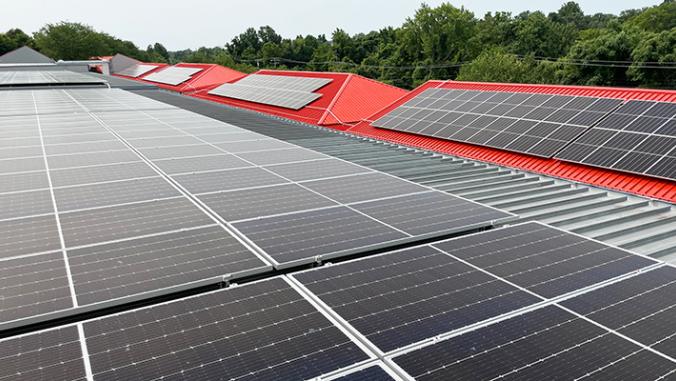Shortly after Vince Digneo joined Palo Alto Networks as head of sustainability, climate and clean energy in July 2021, he launched a review of its environmental, social and corporate governance (ESG) disclosure practices. One question was whether the company could trace the carbon footprint generated by its bank accounts, retirement and 401(k) funds, and other financial relationships.
Through that process, the company and its treasury team uncovered for the first time metrics for emissions attributable to investments and other financial activities.
It’s a modest but "reportable" number — about 9 percent of the cybersecurity company’s Scope 3 emissions, Digneo said. Scope 3 relates to carbon produced by a company’s suppliers as opposed to those created directly by the company itself.
For perspective, emissions by Palo Alto Networks customers’ use of their products is much larger, about 71 percent of Scope 3. Still, "it is significant enough to make sure that we are reporting it," he said. "Once you look at it, you can address it."
Your company’s investments are part of Scope 3 emissions
Palo Alto Networks is one of a small but growing number of companies more closely scrutinizing the impact financial services have on their climate commitments. Others talking about this publicly include Burton Snowboards, Lush Cosmetics, Salesforce and Seventh Generation. The "financial supply chain" includes bank accounts, credit card service providers and retirement funds.
"As we look towards shifting large amounts and flows of capital toward green solutions, we have to also understand where our capital is going now," said Vanessa Fajans-Turner, executive director of BankFWD, a nonprofit pushing for decarbonization of the financial sector, during the GreenFin conference in June. "We need to understand that the money that we aren’t consciously allocating isn’t, in fact, neutral. That it is having an impact, even if we don’t know about it."
We need to understand that the money that we aren’t consciously allocating isn’t, in fact, neutral. That it is having an impact, even if we don’t know about it.
About 24 percent of the money lent by the six largest U.S. banks goes to fossil fuel interests, BankFWD estimates. For several prominent tech companies, the emissions funded by their investments far outstrip the reductions they are making elsewhere, according to "The Carbon Bankroll," a 2022 report by BankFWD and several other organizations. For example, the cash holdings for Google, Meta, Microsoft and Salesforce would boost those companies’ total emissions by 91 percent to 112 percent, the report said.
The impact of retirement accounts is also significant: Most corporate pensions and 401(k) portfolios are directly invested in fossil fuels companies.
More investors should know about these financed emissions, said Steven Rothstein, managing director of the Ceres Accelerator for Sustainable Capital Markets. "There is a growing recognition that disclosure should cover all the elements of emissions,” he said. “If you’re an investor, an employee, a customer, a CEO, you want good information. You don’t want to have a blindfold on."
Your finance team is your biggest ally
This is new territory for both sustainability professionals and finance departments, who are more traditionally interested in liquidity, security and returns.
Seventh Generation first published data about its financial relationships in September 2022 as part of its annual sustainability report. It calculated that "fingerprint" at 9,700 metric tons of carbon dioxide equivalent, roughly the same as the emissions associated with its manufacturing. The analysis covers 2021.
There is a growing recognition that disclosure should cover all the elements of emissions.
One thing the company studied closely were the instruments used to manage Seventh Generation’s cash, said Ashley Orgain, chief impact officer at Seventh Generation. "We need more education in this space, particularly for the practitioners that have been focused on Scope 3 but not on this," she said. "We haven’t been socialized to consider this."
Right now, this is a disclosure exercise. The next phase will include engagement with the banks, to understand whether their investment practices align with Seventh Generation’s targets, Orgain said. Considering that its parent company, Unilever, does business with more than 200 banks, this won’t be an easy task.
Start by asking tough questions
Emma Armstrong, executive director at Anthesis Consulting Group, who works with many tech companies, said a growing number of her clients are asking about financed emissions. For those who have analyzed their exposure, this typically represents a relatively small chunk of total emissions "but it is kind of bigger than you would expect," she said. "This generally comes as a surprise."
Companies can take these steps to get started:
- Understand potential exposure: Consult with corporate treasury teams to map long-term investments or financial services relationships that could be relevant. This includes startup funding through a venture capital arm, as well as the money management practices of corporate foundations.
- Gather relevant emissions data: Collecting those metrics could be complicated, as disclosures by banks and other financial services companies are still limited in their scope and detail.
- Study the footprint: How does the finance supply chain compare with other Scope 3 areas, such as business travel, procurement of goods and services, and so forth?
Questions to ask are summarized in the "Greening Cash Action Guide," published in August by BankFWD, the Exponential Roadmap Initiative and others. They include:
- Does the bank disclose the full scope of its emissions and its exposure to carbon-intensive sectors of the economy?
- Is the bank part of industry alliances pushing for a net-zero transition, such as the Glasgow Financial Alliance for Net Zero?
- Has the bank set science-based targets for halving absolute emissions by 2030?
- Does the bank have a policy against funding projects that expand fossil fuels extraction?
- Does the bank have a zero-deforestation policy?
"The question is really whether any company that is seriously on this [net-zero] journey should invest in non net-zero-aligned companies," Anthesis’s Armstrong said.
The path forward is emerging
Brandi Halls, chief ethics officer for Lush Cosmetics North America, said options for companies are still relatively limited.
Lush began looking at the footprint of its financial partners in 2014, starting with its 401(k) program and its philanthropic funds.
Sustainability professionals should start small with projects where they can make an impact, then build out from there through active engagement, she said.
We need more education in this space, particularly for the practitioners that have been focused on Scope 3 but not on this.
"One discovery made clear in our research is that our retail credit card transactions are handled quite differently than cash transactions," Halls said. "Customers use credit and debit cards far more frequently than cash at a rate of 4:1. So while we do need to continue working with the banks to improve what sort of green products are offered, we know that we need to increase our efforts to better understand the impact of our credit card processors in order to truly reduce our financed emissions."
Rachel Greenberg, head of sustainability at Citizens Financial Group, said companies need to engage with financial partners. "These conversations are coming because there aren’t clear definitions of what people are doing," she said. "Clients are interested in knowing where their deposit dollars are being placed."
Citizens published its inaugural ESG report last December, but it doesn’t yet report on financed emissions. Meanwhile, it is training its commercial banking representatives to field those questions. Citizens has also created products, such as its Sustainable Deposits option, that enable corporations to designate their cash for investments such as renewable energy, climate tech, green buildings or greenhouse gas reduction initiatives. The number of customers using that product doubled from 2022 to 2023, the bank said.






